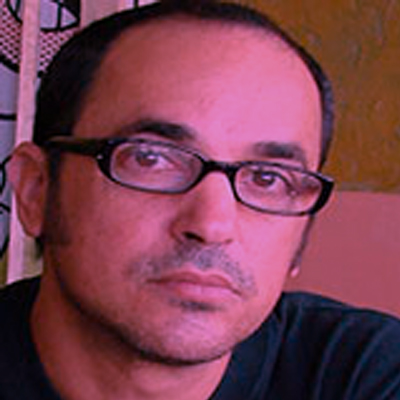¡Le suena ese nombre y apellido? Claro. El abuelo de este entrevistado es el reconocido Eduardo Abela (1889-1965), creador del famoso y querido personaje “El Bobo”.
Este amigo, al que le corre sangre de la alcurnia humorística cubana, lo conocí en las Bienales del Museo del Humor de San Antonio de los Baños, junto a Boligán, Ares y otros “locos geniales” en la segunda mitad de la década de los ochenta del siglo pasado.
Un compadre simpático, un “jodedor” cubano”, y muy buena persona, inteligente y de enorme talento. Enseguida nos hicimos amigos.
Hasta hoy estamos conectados por las redes sociales. Ha hecho una linda carrera en el humor y en la pintura.
Algunos datos biográficos:
Es dibujante, pintor, escultor y grabador. Se gradúa en la Academia de Bellas Artes “San Alejandro” en La Habana, en 1991. Ha realizado exposiciones personales en Cuba. Panamá, Estados Unidos, Puerto Rico y España y muchísimas colectivas. Colabora con numerosas publicaciones periódicas de Cuba, México y España. Ha obtenido inumerables premios en su fructífera carrera.
(Este vis a vis lo realizamos en 2011).
PP: Mi querido Abela, dime la verdad, ¿Te gusta que te hagan entrevistas?
ABELA: Bueno, eso depende de las preguntas y del lugar, por ejemplo, las del cuartico oscuro con un bombillo en la cara, esas siempre son difíciles.
PP: Esas no son entrevistas, compadre. Aquí eres libre de responder lo que quieras y cuando quieras. Aunque claro, si dices algo inapropiado, ya sabes lo que te puede pasar. A ti y a tu familia… ja, ja, no, ya en serio comenzaré esta vis a vis … ¿cómo ves el estado del humor en Cuba, en televisión, radio, teatro, literatura y en la gráfica este año?
ABELA: En general pobre, sobre todo en la TV que es el más que llega a la gente, hay demasiada tontería y mal gusto. Yo sí noté desde hace algún tiempo que se estaban tratando de colar en los medios y hoy ya es evidente la aceptación que tienen, compadre, hay que ser justo y reconocerles el mérito.
PP: Sí, son buenos, hay que reconocerlo. Oye, en varios países de América Latina se dice: "Mi país es un pueblo de humoristas", "En mi país, tú mueves una piedra y sale un humorista", etc. ¿En Cuba se dice lo mismo?
ABELA: Eso ya forma parte de nuestro folklor, fíjate que por acá no solo tenemos humoristas a granel y los mejores chistes, además tenemos las mejores mujeres, somos los mejores amantes, los mejores bailadores, vaya, pa´que seguir diciéndote si después no me vas a creer.
PP: Recién leí en Internet un listado de caractaerísticas de los cubanos, que me dio vergüenza. Era como si fuéramos lo más grande de la creación del universo. El nacionalismo y el chovinismo se reproduce como la mala yerba en el fértil terreno de la ignorancia. En fin, dejemos eso y sigamos con el humor… ¿Para ti es verdad la acuñada frase: "Es más fácil hacer llorar que hacer reír”?
ABELA: Verdad absoluta, piensa por un ratico la cantidad de gente, de situaciones que a diario te dan ganas de llorar, ahora ¿hacer reír? eso es otra cosa, un don, una gracia con la que solo nacen políticos y muy raramente alguna que otra gente por ahí.
PP: De acuerdo. Ahora dime, ¿cuándo decidiste hacerte humorista?
ABELA: No recuerdo exactamente el día que salí del closet, pero creo fue a mediado de los 80.
PP: Lo mencioné sin querer en la presentación. En esa década “nacimos” muchos humoristas en Cuba. Y a propósito, ¿el humorista nace o se hace?
ABELA: El humorista ni se nace, ni se hace, se transforma.
PP: Ja, ja, como la enrigía que tú tienes para no parar de bromear. Sigo… ¿cuál ha sido el mejor y el peor momento de tu carrera en el humor hasta el día de hoy?
ABELA: El mejor momento recuerdo fue cuando me comunicaron había ganado el gran premio de la Bienal de Gabro, el peor, cuando me dijeron que eso era jodedera, vaya, que era una broma.
PP: Ja, ja. Me gustó esa respuesta. Oye, y como profesional del humor, ¿te ríes fácil? ¿Con qué tipo de chistes?
ABELA: Te confieso que últimamente no resulta fácil, tengo que pujar mucho. Hay días que con mucho vegetal, frutas y algo de cereal la cosa fluye pero generalmente paso mucho trabajo. ¿Los chistes que me gustan? Los cortos.
PP: La metáfora quizás no la entiendan muchos, pero está bien. Y para amenizar más esta conversación, ¿puedes contarme alguna anécdota relacionada con nuestra profesión?
ABELA: Déjame ver si te puedo echar algún cuento corto pa´no aburrir a tus lectores. Bueno, here I go, la cosa fue allá a mediado de los años 80, eran mis inicios haciendo humor y se inauguraba una de las Bienales Internacional del Humor de San Antonio de los Baños donde participaba como concursante, sospecho con algún dibujito bastante flojo. Por aquellos días andaba con un amigo full time, de esos socios de andanzas, de parrandas que se llamaba, o se llama, Héctor Luis, pero que cariñosamente todos le decíamos "El Fisherman" y que no tenía nada que ver con el humorismo, solo era mi mejor amigo y punto. Pues parto con mi inseparable escudero a la inauguración de la Bienal en San Antonio, que por cierto, en aquel momento era un evento de mucha calidad, un indiscutible referente de lo mejor en materia de humor gráfico latinoamericano y mundial, además que se pasaba requetebién en un ambiente de fiestas muy bien surtiditas, era la época de la bonanza donde en cualquier evento de participación internacional, ya sea de humor, que de Oftalmología, tiraban la casa por la ventana. El jurado de la Bienal siempre lo integraban importantes caricaturistas y personalidades del humorismo internacional como Quino, Fontanarrosa, vaya, la crema y nata y en aquella edición había venido como jurado un caricaturista que ahora no recuerdo de que país, ni como se llamaba, solo que era todo un personaje muy pintoresco, de barba tupida y pañuelo en la cabeza, tipo motociclista de Harley Davinson. Estando en el acto de inauguración donde oficialmente presentaron al jurado, me percato que mi amigo “El Fisherman” que por aquel entonces llevaba barba, se parecía bastante a aquel señor y terminado el acto, se nos ocurre ponerle al “Fisherman” un pañuelo en la cabeza y colgarle mi credencial en el pecho y divertirnos un ratico, lo que no sospechábamos fue que a partir de ese momento la cantidad de cosas que hicimos en aquel pueblo fue como para venderle el guión al mismísimo Tarantino jejeje... eso es jodedera mía. Solo te voy a contar un par de ellas, la primera fue irnos a casa de la novia de Boligán, Sandra que vivía allá en San Antonio, tocamos en su puerta, por supuesto, el Boli y yo nos escondimos detrás de unos árboles y dejamos solo a mi socio, el doble del jurado. Cuando Sandra abre, inmediatamente mi socio comenzó a bajarle una jerigonza y una verborrea de disparates, que Sandra se puso tan nerviosa que comenzó a gaguear, no le salían las palabras, realmente el “Fisherman” estaba estresante porque además de hablar enredado, lo hacía en un tono muy alto. En medio de aquella locura, Sandra decide llamar a un primo que estaba de visita en su casa y que hablaba inglés para a ver si lograban sintonizar con mi socio que seguía ladrando. Después de algunos minutos intentando entenderse, el primo se vira para Sandra y le dice: no way, este señor debe estar hablando alemán o quizás alguna lengua rara de los países nórdicos. Mi socio demostró tener una sangre fría pues en ningún momento se río, ni titubeó y aquel par de guajiritos han pasado un mal rato que por nada se cagan, sobre todo el primo traductor. Otro momento simpático fue en un show donde habían preparado unas gradas especialmente para que el jurado y personalidades invitadas al evento pudieran disfrutar de un espectáculo donde dos comparsas tradicionales competían, creo una era La Charanga de Bejucal. Esa tarde estábamos algo aburridos y decidimos irnos a ver el show y cuando llegamos al lugar, un cordón de seguridad de varios policías, te juro que esto es verdad, nos abrió paso dejándonos llegar hasta donde estaban las butacas vip y allí nos sentamos al lado de Fernando Birri, que cuando aquello era el director de la Escuela Internacional de Cine de San Antonio. Habían otros señores, supongo, ilustres visitantes y aquella tarde disfrutamos de la función que incluía servicio 5 estrellas y hasta conversamos con Birri. En los siguientes días de la Bienal, otros nóveles caricaturistas se nos fueron uniendo para disfrutar de los "privilegios" del jurado. Para terminarte el cuento, recuerdo ir caminando por el pueblo y los lugareños invitándonos a sus casas y brindarnos café, dulces caseros, etc. También bebimos gratuitamente en varios bares, tabernas y cafeterías. Pepe, esa fue la semana más divertida y barata de toda mi vida, llegamos a cogerle tanto el gustico a que nos atendieran tan cariñosamente, que ya ni nos interesaba aclarar la broma. Al final, creo estuvimos incursionado dentro de las tendencias más novedosas del arte contemporáneo, vaya, que tiramos hasta nuestro performancito en la Bienal.
PP: Bueno, yo no lo llamaría un cuento corto como dijiste al inicio. Por poco no te alcanza todo el libro. Pero está bien, está buenísima la anécdota. En esas Bienales conocí y viví muchas anécdotas de ese estilo con mi grupo. Muchas tú las conoces. A veces me dan ganas de revivirlas. Bueno, continúo, ¿con cuáles colegas te identificas más?
ABELA: Saul Steinberg, Jean Michael Folon, Elio Flores, LPO, Roland Topor, Ralh Stewart, El Roto, un motón, muchísimos más. En general me interesa el humor en la línea, en el dibujo y no el chiste con parlamentos, o sea, con el globito, ahh... me encanta el humor de Le Luthiers, aunque no hagan dibujitos, Chaplin, pa´qué contarte, mi ídolo.
PP: Tienes buen gusto. Y para ir cerrando, ¿qué me aconsejas a mí como humorista?
ABELA: Pepe, búscate un part time, la cosa pinta muy fea.
PP: Ja, ja, gracias por el consejo, hermano mío.
Abela querido, te doy miles de gracias por tu tiempo y esfuerzo para quedar bien conmigo en este vis a vis. Te deseo mucha suerte, salud y que siempre te lleguen los éxitos.
Un abrazo, amigo mío.
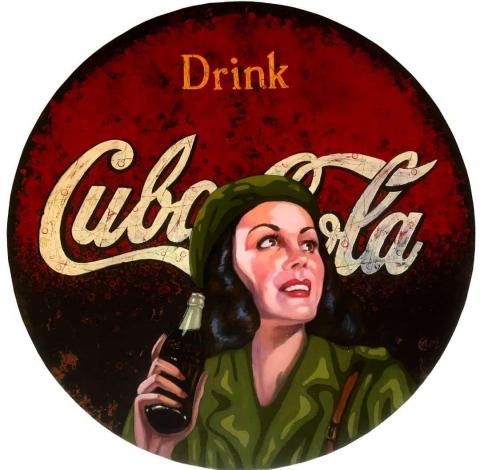
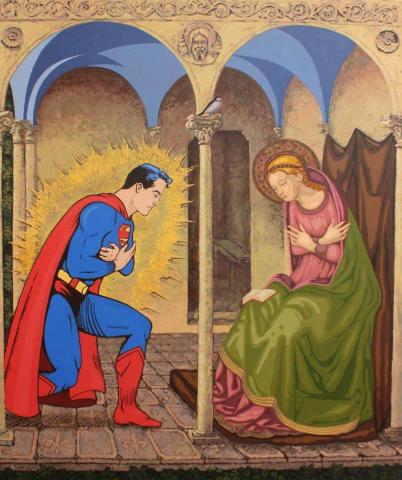
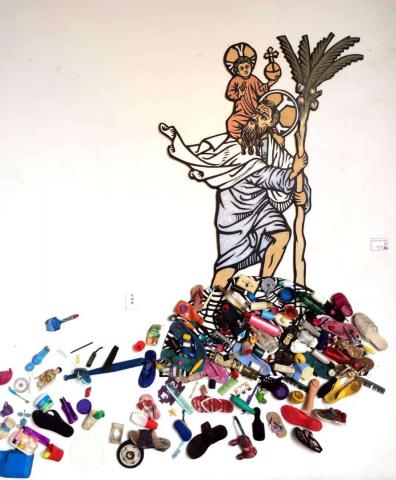
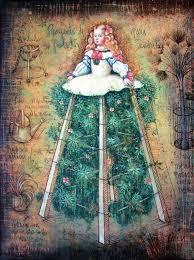
Interview with Eduardo Abela
by Pepe Pelayo
Does that name sound familiar? Of course. The grandfather of this interviewee is the renowned Eduardo Abela (1889–1965), creator of the famous and beloved character “El Bobo.”
This friend, who has the blood of Cuban comedic nobility running through his veins, I met during the Humor Biennials at the Museum of Humor in San Antonio de los Baños, alongside Boligán, Ares, and other “brilliant madmen” in the second half of the 1980s.
A charming guy, a Cuban "jokester," and a truly good person—intelligent and immensely talented. We quickly became friends.
To this day, we’re still connected through social media. He has built a beautiful career in humor and painting.
Some Biographical Details:
He’s a cartoonist, painter, sculptor, and printmaker. He graduated from the San Alejandro Academy of Fine Arts in Havana in 1991. He’s had solo exhibitions in Cuba, Panama, the United States, Puerto Rico, and Spain, along with countless group exhibitions. He collaborates with numerous periodicals in Cuba, Mexico, and Spain and has won countless awards throughout his fruitful career.
(This face-to-face interview took place in 2011.)
PP: My dear Abela, tell me the truth—do you like being interviewed?
ABELA: Well, that depends on the questions and the setting. For example, those interviews in a dark little room with a lightbulb shining in your face—those are always tough.
PP: Those aren’t interviews, my friend. Here, you’re free to respond however and whenever you want. Though, of course, if you say something inappropriate, you know what could happen to you and your family… Ha! Just kidding. Let’s get serious and start this face-to-face… How do you see the state of humor in Cuba—in television, radio, theater, literature, and graphic art this year?
ABELA: Overall, it’s pretty poor—especially on TV, which reaches the most people. There’s too much nonsense and bad taste. I’ve noticed for a while now that certain quality works are trying to sneak into the media. And today, it’s clear that they’re gaining acceptance. We have to be fair and acknowledge their merit.
PP: Yeah, they’re good—we have to admit it. Hey, in several Latin American countries, people say things like, “My country is a nation of comedians,” or, “In my country, if you lift a stone, a comedian pops out.” Do people in Cuba say the same?
ABELA: That’s already part of our folklore. Look, over here, we don’t just have comedians in abundance and the best jokes—we also have the most beautiful women, we’re the best lovers, the best dancers… Why keep going if you’re not going to believe me?
PP: I recently read an Internet list of Cuban characteristics, and I was embarrassed. It was like we were the pinnacle of creation in the universe. Nationalism and chauvinism grow like weeds in the fertile soil of ignorance. Anyway, let’s move on and get back to humor. Do you think the phrase “It’s easier to make someone cry than to make them laugh” is true?
ABELA: Absolutely true. Just think for a moment about how many people and situations make you want to cry every day. But making people laugh? That’s something else—a gift, a grace that only politicians and, very rarely, a few other people are born with.
PP: Agreed. Now tell me—when did you decide to become a humorist?
ABELA: I don’t remember the exact day I “came out of the closet,” but I think it was around the mid-1980s.
PP: I unintentionally mentioned it in the introduction. Many Cuban humorists “came into being” during that decade. By the way, are humorists born, or are they made?
ABELA: A humorist is neither born nor made—they’re transformed.
PP: Ha! Like the energy you have to keep joking nonstop. Moving on… What has been the best and worst moment of your career in humor so far?
ABELA: The best moment I remember was when they told me I had won the grand prize at the Gabro Biennial. The worst? When they told me it was a joke!
PP: Ha! I loved that answer. Tell me, as a professional humorist, do you laugh easily? What kind of jokes do you like?
ABELA: I confess that lately, it hasn’t been easy. I really have to push. Some days, with lots of veggies, fruits, and some cereal, things flow better. But generally, it’s a struggle. What jokes do I like? The short ones.
PP: Maybe not everyone will understand the metaphor, but that’s okay. To liven up this conversation, can you share an anecdote related to our profession?
ABELA: Let me see if I can tell you a short story to avoid boring your readers. Well, here I go… Back in the mid-1980s, when I was just starting out in humor, one of the International Humor Biennials was being inaugurated in San Antonio de los Baños. I was participating as a contestant—probably with a pretty mediocre cartoon. At the time, I was always hanging out with a close friend, Héctor Luis, whom we affectionately called “The Fisherman.” He wasn’t involved in humor at all—just my best buddy, period.
So, my trusty sidekick and I head to the Biennial’s inauguration. It was a high-quality event, a benchmark for the best in Latin American and global graphic humor. The jury included important cartoonists like Quino and Fontanarrosa—the cream of the crop.
At the inauguration, we noticed a jury member who looked quite colorful—a bearded guy with a Harley Davidson biker vibe. Seeing that my friend Fisherman also had a beard and resembled the guy, we put a bandana on him, hung my ID around his neck, and decided to have some fun…
At the inauguration event, where the jury was officially introduced, my friend “The Fisherman” was a dead ringer for the jury member. So after the event, we decided to put a bandana on him, hang my credential around his neck, and have a little fun. What we didn’t realize was just how far things would go after that!
From that moment on, the things we did in that little town could have been a script for Tarantino himself—haha, just kidding. I’ll only share a couple of the more memorable moments.
The first one was when we decided to visit Boligán’s girlfriend, Sandra, who lived there in San Antonio. We knocked on her door, and of course, Boli and I hid behind some trees, leaving my friend, the “jury member,” standing there alone. When Sandra opened the door, my friend immediately started babbling nonsense, speaking in a mix of gibberish and a loud, confusing tone. Poor Sandra was so nervous she started stuttering, unable to get any words out.
In the middle of this chaos, Sandra decided to call her cousin, who happened to be visiting and could supposedly speak English, to try to communicate with my “Nordic” friend. After a few minutes of struggling to understand, the cousin turned to Sandra and said, “No way—this man must be speaking German or some other weird Nordic language.”
The Fisherman kept his cool the whole time, never laughed or broke character. Sandra and her cousin were so flustered they nearly panicked. They genuinely thought they were dealing with some eccentric foreigner.
Another funny moment was during a show where they had prepared a special VIP section with bleachers for the jury and invited personalities to enjoy a performance by two competing traditional comparsas—one of which I think was La Charanga de Bejucal.
That afternoon, feeling a bit bored, we decided to head to the show. When we arrived, a police security cordon immediately opened up for us, allowing us to pass straight to the VIP seats. We ended up sitting next to Fernando Birri, who at the time was the director of the International School of Film in San Antonio.
Other illustrious guests were there too. That afternoon, we enjoyed the show in full VIP style, complete with five-star service, chatting casually with Birri and the others. Over the following days of the Biennial, more novice cartoonists joined us, eager to enjoy the “privileges” of being mistaken for jury members.
To finish the story: I remember walking through the town with people inviting us into their homes, offering us coffee, homemade sweets, and more. We also drank for free in various bars, taverns, and cafes. Pepe, that week was the most fun—and cheapest—week of my life.
We enjoyed the special treatment so much that, honestly, we stopped caring about clarifying the joke. In the end, I think we were delving into the most avant-garde trends of contemporary art. Who knows—maybe we even did a little performance art at the Biennial!
PP: Well, I wouldn’t call it a short story like you promised at the beginning. It’s practically a chapter! But it’s fantastic—the anecdote is great. At those Biennials, I experienced and heard many stories like that with my group. You know some of them. Sometimes I feel like reliving those days. Let’s continue: Which colleagues do you identify with the most?
ABELA: Saul Steinberg, Jean-Michel Folon, Elio Flores, LPO, Roland Topor, Ralph Steadman, El Roto… a ton—too many to list. In general, I’m drawn to humor in the lines and drawings, not jokes with dialogue bubbles. Oh, and I love the humor of Les Luthiers—even though they don’t do cartoons. And Chaplin—what can I say? He’s my idol.
PP: You’ve got great taste. To wrap things up, what advice would you give me as a humorist?
ABELA: Pepe, get yourself a part-time job—things are looking pretty bleak!
PP: Haha, thanks for the advice, my brother.
Abela, my dear friend, I can’t thank you enough for your time and effort to make this face-to-face interview such a success. I wish you all the luck, health, and success in the world.
A big hug, my friend.
(This text has been translated into English by ChatGPT)

